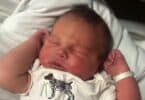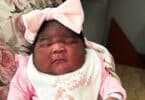When Marisa Christie arrived at Memorial Hermann Woodlands Medical Center for a planned cesarean section, she was prepared to welcome her triplets into the world. What she didn’t know was that the day would take a life-threatening turn that few could have anticipated.
The 30-year-old mother from Tomball, Texas, had been experiencing a relatively smooth delivery when things took a scary turn.
“I remember the doctors resting the babies on my stomach for delayed cord clamping,” Marisa recalls. “Then, my arms flew up involuntarily—and that’s when my heart stopped.”
Marisa had experienced an amniotic fluid embolism (AFE), a rare and often fatal complication that triggers a catastrophic reaction in the body after amniotic fluid enters the mother’s bloodstream. Her care team, led by maternal-fetal medicine physician Dr. Amber Samuel and anesthesiologist Dr. Ricardo Mora, sprang into action. What followed was a battle for survival that would ultimately defy the odds.
Marisa and her husband, Dylan, already parents to a 4-year-old son, had been trying to have another child for two years. After consulting her doctor, Marisa began using an ovulation trigger shot to boost her chances of conceiving. When the couple learned she was pregnant, they were overjoyed.
That joy soon turned to shock at her first ultrasound.
“The doctor told us, ‘It’s twins—possibly triplets,’” she says. “I cried for a month, wondering how we could handle life with four kids.”
As the initial shock wore off, excitement grew, even though carrying multiples proved challenging. Marisa experienced severe nausea for five months and struggled to remain on her feet in the later stages of pregnancy. Complications soon arose when it was discovered that one of the babies had an undeveloped twin in the same sac. This “vanishing twin” posed a serious risk to Baby C, whose heart was under stress from shared blood flow. Doctors performed a delicate in-utero procedure to prevent further complications.
By the time Marisa reached 33 weeks, her care team decided it was time to deliver the babies via C-section. On August 21, Marisa and Dylan entered the operating room, brimming with anticipation. The triplets—Charlotte, Kendall, and Collins—were born healthy. But as they were placed on their mother’s chest, an emergency unfolded.
Dr. Mora, who had seen AFE only once before in his 15-year career, immediately recognized the signs.
“She was seizing and turning gray,” he says. “We called a code blue and started CPR. She had no pulse.”
Amniotic fluid embolism triggers a chain reaction in the body, including cardiac arrest, respiratory failure, and widespread clotting followed by massive hemorrhaging. For 45 minutes, Marisa’s heart didn’t beat on its own. During this time, her medical team replaced her entire blood volume and connected her to ECMO, a machine that pumps blood and oxygen through the body when the heart and lungs fail.
“It’s like being struck by lightning,” Dr. Samuel explains. “AFE is incredibly rare, affecting less than 1 in 40,000 deliveries, and it’s often fatal. Survival rates are about 15%.”
Even after stabilizing Marisa on ECMO, her fight wasn’t over. She experienced uncontrollable bleeding, requiring an emergency hysterectomy. Surgeons left her incision open to monitor bleeding and avoid additional surgeries.
For a week, Marisa lay unconscious. When she finally woke, the weight of what had happened began to sink in.
“My husband told me, ‘The babies are healthy and beautiful,’ but I was terrified—I didn’t even remember giving birth,” Marisa says.
Meeting her daughters for the first time felt surreal. “They were over a week old. I didn’t feel like I knew them,” she admits. But thanks to the care team’s thoughtful efforts—placing her scent on baby blankets and allowing skin-to-skin contact even while she was unconscious—the triplets instantly recognized her voice and touch.
When Marisa returned home, her recovery was grueling. Attached to a wound vac with her core muscles severely weakened, she lived in a recliner and leaned on Dylan for support. The staggered discharge of the triplets—Charlotte first, followed by Kendall and Collins—allowed her to adjust to life with three newborns and a toddler.
“It was a blessing in disguise,” she says. “I got to ease into the chaos.”
Nine weeks after delivery, Marisa’s wound finally healed. Although her physical recovery has been remarkable, the emotional impact of her near-death experience lingers.
“I feel like a completely different person,” she says. “Trauma changes your perspective on everything.”
Now, Marisa is sharing her story to raise awareness about AFE, a condition she had never heard of before her ordeal.
“It’s so rare, but it does happen,” she says. “There were so many miracles that allowed me to survive. I want other moms to know there’s hope, even in the scariest moments.”
Her care team also emphasizes the importance of preparedness in such emergencies. “AFE can’t be predicted or prevented, but having trained staff, access to blood products, and life-saving equipment like ECMO makes a difference,” says Dr. Mora.
Today, Marisa is focused on raising her growing family, cherishing every moment with her daughters and son.
“We’re incredibly grateful,” she says. “Every time I see my girls smile, I’m reminded how precious life is.”
AFE occurs when fetal material enters the mother’s bloodstream, triggering a severe reaction. Symptoms include cardiac arrest, seizures, and bleeding. Risk factors include carrying multiples, advanced maternal age, and certain medical conditions, but the cause remains largely unknown. While extremely rare, hospitals are increasingly equipped to handle this life-threatening complication.
More Childbirth News:







